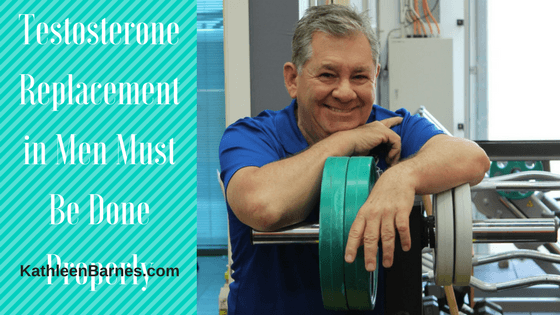by Dr. Robert Thompson and Kathleen Barnes
Do older men who take testosterone therapy risk having a heart attack, stroke or to die in the next couple of years?
That’s the conclusion of a widely publicized =– and exceptionally flawed — study from the VA Eastern Colorado Health Care System in Denver.
This one study, after decades of research confirming the heart protective effects of appropriate testosterone replacement, has caused patients and doctors alike to consider stopping male hormone replacement therapy (HRT), much to their detriment.
This study was apparently designed by doctors and researchers who have no idea how to safely restore testosterone levels in aging men.
It’s a complex issue, so please bear with us.
First, many of the men in the study published in the Journal of the American Medical Association had not had their testosterone levels properly tested and many of them already had heart disease when they entered the study. That alone makes the findings of the study questionable.
Testosterone replacement is heart protective in men and the Colorado study actually proves it, although the doctors interpreted the results in the wrong way.
All prior research shows that testosterone levels in men should be above 500 mg/dL. In fact, Dr. Thompson believes that optimal youthful testosterone levels should be in the 700-900 ng/dL range, as has been shown by extensive research for decades. Yet the men in the Colorado study were only at a level of 332 ng/dL, so their. testosterone levels were still very low, despite the testosterone replacement. This study actually confirms the increased risk of heart attack level in men with low T, not the opposite as the ill-informed researchers concluded.
There’s another hormonal element that is a bit more complex, so bear with us.
Men who have abdominal body fat have a tendency to convert testosterone to excess estradiol, a form of estrogen. The excess estrogen alters clotting factors in the their blood, potentially increasing the risk of heart attack and stroke. Researchers in the Colorado study appear not to have factored out men with abdominal fat.
Finally, you’ve probably seen those television commercials promoting the topical deodorant style testosterone replacement. That stuff is terrible! It rubs off on others who don’t need it, is poorly absorbed and takes two weeks to reach “steady state” levels. And it’s expensive—about ten times what generic hormones cost.
The problem is that doctors are poorly trained, if they are trained at all in the art of hormone replacement. They are administering hormone or hormone look-alikes that are not hormones at all without knowing what they are doing, without knowing the proper dosage and without proper training or even knowing the appropriate levels.
The science of the benefits of testosterone replacement in men is clear, yet ignorance on the part of the medical profession abounds. Most doctors have never heard of transmucosal therapy, which has 100% absorption, peak dosage in 30 seconds and is absolutely and predictable dosing at a cost of 1/10th of the junk advertised on TV.
If you are a man over 40 or you love one, have blood tests done, quiz the doctor about levels and therapies and make a good choice. If your doctor doesn’t know about the appropriate levels noted in this article, or if topical testosterone is recommended, find another doctor who is better informed.








Comments are closed.